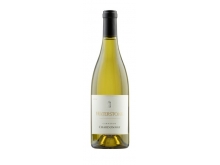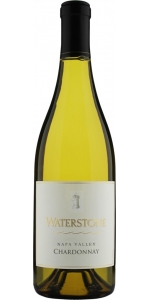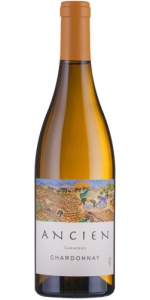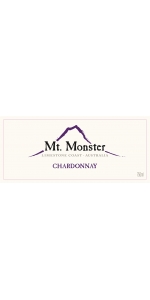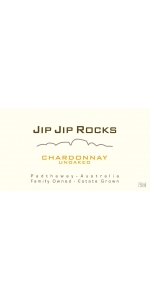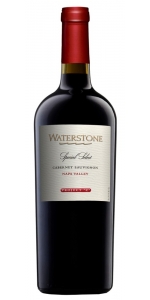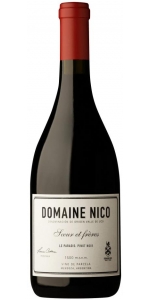Waterstone Chardonnay Carneros 2016
| Country: | United States |
| Region: | California |
| Winery: | Waterstone |
| Grape Type: | Chardonnay |
| Vintage: | 2016 |
| Bottle Size: | 750 ml |
This Chardonnay features bright, concentrated citrus, pear, green apple and nectarine fruit, with just a touch of oak to add richness to the palate. The wine lingers on the palate, and has the structure and acidity to provide for good longevity.
fter whole-cluster pressing, the Chardonnay juice was barrel-fermented in French oak barrels and aged sur lie for 8 months. During this period, the barrels were routinely stirred to increase yeast contact and add richness; 30% of the wine underwent secondary malo-lactic fermentation. One- and two-year-old French oak barrels were used. Prior to bottling, the wine received minimal filtration and fining to preserve the fresh fruit flavors.
The Waterstone Wines Estate
In this time of multimillion-dollar vineyard estates and celebrity winemaking consultants, when it seems that financial backing has replaced skill as the key to success in enology, it is rare that a simple idea can give birth to wines that stand out for flavor and balance, rather than pedigree alone. A collaboration between veteran winemaker Philip Zorn and longtime wine executive Brent Shortridge, Waterstone Winery was formed in 2000 when the two men were introduced and discovered a shared interest in creating luxury wines at affordable prices. Bringing together their previously established relationships with Napa Valley growers and vintners, the pair set out to develop balanced wines of varietal character through intelligent sourcing. Preferring to focus on the wine itself rather than the accumulation of land and facilities, Zorn and Shortridge own no vineyards themselves, nor do they own the facility where their wines are made. Dedicated winemaking, strong relationships with top growers and long-term grape contracts are the keys to Waterstone’s quality and success.
The grapes for this wine were grown in the Oak Knoll District of Napa Valley, where soils are transitional from gravel to silty clay loam. The climate is moderate to cool with marine air until mid-morning and frequent late afternoon breezes that maintain cooler temperatures and ensure a longer growing season. Chardonnay from this region showcase flavors of crisp apple, mineral notes and tropical fruit with good acidity.
Aromas of lemon curd, sweet butter, brioche and sun-ripened peach mingle with notes of nutmeg and vanilla bean. The palate is creamy, with zesty lemon overtones and minerality persisting on the finish.
Ancien Chardonnay Carneros is made from 100 percent Chardonnay.
Chardonnay Carneros owes its style, depth, and structure to intensely flavored, low yielding, heirloom clones growing in two Carneros vineyards: on the Napa side, the Toyon Farm and on the Sonoma side, the Sangiacomo Vella Ranch. Ancien Wines hand-selected the cuttings themselves, from older vineyards in the Carneros area. These cuttings are reputed to have origins tracing to Paul Masson who imported them from Burgundy in the early 1940’s, from Louis Latour's renowned Corton Charlemagne vineyard. These selections are often referred to as “Old Wente”or “Robert Young,”denoting the sourced mother blocks in the 1960s.
Notes of ripe apple and honeydew melon greet and are delicately perfumed by notes of freesia and citrus blossom. Brighter notes of lime and Meyer lemon match the refreshing acidity of this wine, balanced by a creamy palate and leading to a finish that will continue to lengthen in the coming months. A wonderfully textured and vibrant Chardonnay displaying the best of Carneros.
Chardonnay Carneros is guided toward a layered, complex, and expressive style that develops gracefully in the bottle and shows enticing minerality, vivacious fruit, length and structure. The watchword is balance. Grapes were pressed as whole clusters, settled and fermented entirely in French oak from four different coopers, chosen for their unique synergism and support of the fruit on the palate. One third of the barrels were new. A variety of yeasts were used, including native strains, and fermentation proceeded evenly and slowly, averaging a cool 55°F. The wine was aged on its yeast lees, which were stirred weekly through the spring.
Mt Monster Chardonnay is made from 100 percent Chardonnay.
Gentle pressing and free run juices create the base of this wine.
Traditionally Mt Monster Chardonnay is 100% fermented and matured in stainless steel, this receives some lees contact to add texture and complexity to the palate, but essentially this wine is pure Chardonnay fruit.
Review & Tasting notes:
Bright straw color, with hints of lime green. Fresh figs and melon, with vibrant lemon citrus fruit. The nose also shows some yeast complexity from extended lees contact. Fresh tangy melon fruit flavors, & a clean acid finish. Although it may benefit from up to 2 years maturation in bottle, this wine is best consumed when young and fresh.
- Australian Wine Showcase (December 2016), 94 pts
Jip Jip Rocks Chardonnay 2014 is made from 100 percent unoaked Chardonnay.
Light yellow with a pale straw hue. A classic nose of lemon, fresh stonefruit and melon. The palate is clean and fresh with mineral characters underpinning ripe pineapple and lime flavours. This wine will age beautifully over the next 4-5 years.
Winemaking report: Gentle pressing and free run juices create the base of this wine. Traditionally Jip Jip Rocks Chardonnay is a 2/3 blend fermented and matured in stainless steel and 1/3 fermented in stainless steel, which receives extended lees contact to add texture and complexity to the palate.
The backbone of this Cabernet Sauvignon is derived from a vineyard in the Atlas Peak AVA of Napa Valley where soils are volcanic in origin and have limited water retention. The balance of fruit is sourced from Coombsville and Oak Knoll. The small berry clusters and intense fruit from low-yielding vines create a wine with full flavor and longevity.
This Cabernet delivers multi-layered aromas of ripe black cherries, toasted oak, dark chocolate, cardamom, vanilla bean, and cedar. A rich medium-bodied wine with plush rounded tannins and juicy blackberries and orange zest that linger on the finish.
TA: 0.72 g/100ml
pH: 3.59
Domaine Nico le Paradis Pinot Noir is made from 100 percent Pinot Noir.
The cool climate vineyard that belongs to Laura and her sister Adrianna Catena feels like paradise itself to Laura. It is lined by trees and fruit orchards, with majestic views of the Andes. Inside the 12 Hectare vineyard, there is a little house with two tiny bedrooms and a kitchen, where Laura dreams of spending a whole month reading books-Laura's version of paradise. The little house is affectionately named Chateau Laura. About the Vineyard The tiny parcel where Le Paradis is grown was planted in 2011 with Dijon 667 Clones over two acres. Wine Production The grapes from this small parcel were elaborated in 15 separate microvinifications.
All the microvinifications were fermented with indigenous yeast. 20% of the microvinifications were fermented with 100% whole clusters in oak roll-fermentor of 600L and low temp (22 Celcius degrees). 40% were fermented with 20% whole cluster in small vats of 800L and 40% fermented in small vats of 800L without sulfites until 4%V/V of alcohol.
Review:
From soils rich in calcium carbonate and sand, in a vineyard 1,600 meters above sea level, this wine comes from a selection of 2.7 hectares that produced very little fruit in 2016, just barely enough to fill 800 bottles. But watch out for this white, with its edge, its minerality, those saline notes that are so characteristic of chardonnay from the chalky Gualtallary soils. The wine was aged for a year in used barrels, and it has some of the toast, but here it’s the deep minerality that dominates.
Patricio Tapia - Descorchados 96 Points
- back
Matthews Winery Columbia Valley Cuvee is made from 65% Merlot, 27% Cabernet Franc, 8% Malbec.
The 2021 Columbia Valley Cuvée sparkles with purple and deep garnet in the glass. Meadow flowers, fresh red berry, black plum, and cocoa powder aromas exhilarate leading to flavors of morello cherry liqueur, cardamom, mountain blackberry, and licorice snaps. This merlot-dominant blend is plush and weighty on the palate with powdery tannins. Dark stone fruits and dusty minerality coat the palate for a long, seamless finish.
Reviews:
A handsome blend, structured and polished, with expressive black cherry flavors accented by tarragon, mocha espresso and toasty spices that sail toward refined tannins. Merlot, Cabernet Franc and Malbec. Drink now through 2031.
-Wine Spectator 93 Points
This Merlot-based blend is a part of the Matthews tradition. Wildly fruity aromatics with whole berries, destemmed aromas driven by red berries, mountain blueberries, and a touch of green peppercorn and mocha dust. A streak of graphite underlines red berries, early season blackberries and a savoury herbal character that mingles complexity with fresh ripe fruits.
-Decanter 93 Points
Schramsberg Brut Rosé is fruitful, complex and dry, making it both versatile with food and delicious by itself as an apéritif. The character of the wine is most strongly influenced by bright, flavorful Pinot Noir grown along the coast from southern Mendocino County to northern Marin County.
Reviews:
"These bubbles are fresh and zesty, with aromas of strawberry, raspberry, apricot, orange creamsicle and blood orange zest on the nose. Creamy, super-firm and tiny bubbles mark the midpalate, while flavors of pink grapefruit and guava overtake the mouthfeel. The massive acidity, salinity and mouthwatering finish make one want to eat and drink more."
-Wine Enthusiast 94 Points

